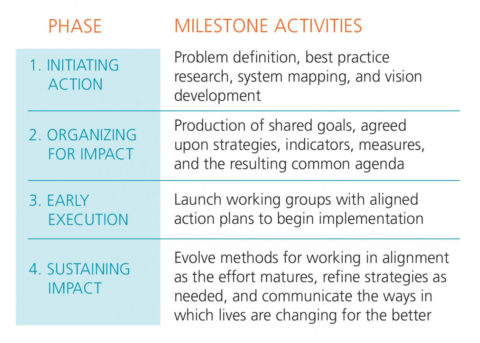What is Giving Compass?
We connect donors to learning resources and ways to support community-led solutions. Learn more about us.
Search our Guide to Good
Start searching for your way to change the world.
Giving Compass' Take:
• Collective impact is an accessible way to approach systems change work because it leverages many parties to address the root causes of a complex problem.
• What are some examples of a collective impact approach working to change systems?
• Read about the roots of philanthropic systems change.
Chronic community level challenges fall into the last category of problem, but traditional approaches to solving community problems often failed to adequately address the inherent complexity. For far too long, placed-based initiatives and community revitalization efforts were designed for incremental improvements to discrete problems. This would often manifest as many programs working in isolation of one another that were good at treating the symptoms of a community’s problems, but never managed to address the root causes. As such, these “program rich and system poor” efforts did not untangle the underlying and intersectional issues that had compounded over time, effectively creating an environment that held problems in place.
Across the globe, collective impact approaches have been structured to shift conditions that hold problems in place. While no two efforts are identical in their design, leaders focused on chronic community level challenges frequently structure collective impact in four distinct phases once it is determined that readiness exists to move forward with collective impact:

In order to solve complex problems we need to see and leverage the entire system. However, the language of systems change can sometimes be abstract, making it hard to get started. Fortunately, collective impact provides us with a familiar and accessible way to approach systems change.
Collective impact is a structured, multi-sector approach to changing systems for improved population level outcomes. Unlike other approaches to collaboration, collective impact is defined by long-term alignment around a common agenda that seeks to address root causes of a systemic problem.
Despite recent message frames in the social sector, collective impact and systems change are not mutually exclusive. Systems change is both a process and an outcome. Both a verb and a noun. Collective impact is literally an approach for leveraging representatives of a system to change the conditions associated with a complex problem.
So, those wishing to remedy large-scale, community problems by systemically addressing their root causes shouldn’t feel overwhelmed by the prospect.
Read the full article about systems change and collective impact by Ursula Wright at FSG.